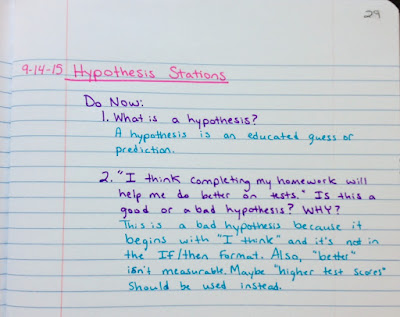It is important to have a routine students can count on
every day. Having the same procedures every day cuts down wasted learning time
significantly. Here is the beginning of class routine I’ve used for the last
three years in my seventh grade science classroom.
During the passing period before every class, I stand
outside of my classroom and greet all of my students. I’m happy to see them
again! Just saying hello, having a short conversation, or noticing a new
haircut helps me build and maintain a positive relationship with each student,
something that’s very important to me. (If you need more ideas on how to build
positive relationships with even the most difficult students read this blog post.) Greeting the students before class sets the tone for a positive learning
environment.
The first thing the students see when they walk into my
classroom is a whiteboard I keep propped right in front of the door so students
cannot miss it. The board lists the beginning of class directions. For example,
it might say
- Hand in Hypothesis Worksheet 1 homework.
- Get your interactive notebook.
- Begin your Do Now.
Because I spent time early in the year establishing the
beginning of class procedures, my students know they should be in their
seats with their interactive notebooks by the time the bell rings. (Find information
on setting up and organizing INBs here.) On the Promethean Board is a PowerPoint
slide showing their Do Now. This is typically what the slide looks like:
While I take roll call and take care of basic
teacher housekeeping items, the students complete their Table of Contents and
write the Do Now questions and answers in their INBs. I require students to write
the questions in their INBs so they have potential test questions and answers to
study in the future. Because the students need to work on their writing skills,
they must answer the questions in complete sentences. The Do Now questions
either review the previous lesson’s content or introduce the new content. To
ensure students stay on task, I use a stopwatch to time their Do Now. Typically,
I provide five minutes to complete the Do Now and add a minute or two if
needed. Here is a completed Do Now:
When time is up, we discuss the answers together as a class.
Students add to or change their answers as needed. Then we go over the day’s
objective, rationale, and plan so students know what they are learning, why
they are learning it, and how they’ll be learning it.
Well, that’s my beginning of class routine. It takes less
than ten minutes, but it gets the class started without wasting learning time.
The students’ minds get activated right away and ready to learn new content.
Thanks go to Desktop Learning Adventures and the ELA Buffet for setting up this blog hop.


